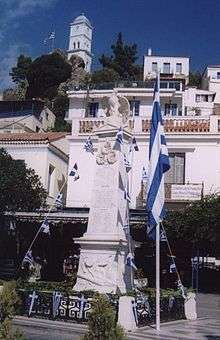Ohi Day
Ohi Day or Oxi Day (Greek: Επέτειος του Όχι, Epéteios tou Óchi [eˈpetios tu ˈoçi]; "Anniversary of the No") is celebrated throughout Greece, Cyprus and the Greek communities around the world on 28 October each year. Ohi Day commemorates the rejection by Greek dictator Ioannis Metaxas of the ultimatum made by Italian dictator Benito Mussolini on 28 October 1940, the Hellenic counterattack against the invading Italian forces at the mountains of Pindus during the Greco-Italian War, and the Greek Resistance during the Axis occupation.
| Ohi Day (Ημέρα του όχι) | |
|---|---|
| Observed by | Greece, Cyprus, and Greek diaspora |
| Celebrations | family reunions, military and student parades |
| Date | 28 October |
| Next time | 28 October 2020 |
| Frequency | annual |
Ultimatum
This ultimatum, which was presented to Metaxas by the Italian ambassador to Greece, Emanuele Grazzi, shortly after 03:00 am on 28 October 1940, who had just come from a party in the Italian embassy in Athens, demanded Greece allow Axis forces to enter Greek territory and occupy certain unspecified "strategic locations" or otherwise face war. It was allegedly answered with a single laconic word: όχι (No!). However, his actual reply was, “Alors, c’est la guerre!” (Then it is war!).[1][2]
In response to Metaxas's refusal, Italian troops stationed in Albania, then an Italian protectorate, attacked the Greek border at 05:30 am—the beginning of Greece's participation in World War II (see Greco-Italian War and the Battle of Greece).
On the morning of 28 October, the Greek population took to the streets, irrespective of political affiliation, shouting 'ohi'. From 1942, it was celebrated as Ohi Day, first mostly among the members of the resistance and after the war by all the Greeks.

Anniversary
During the war, 28 October was commemorated yearly in Greece and Cyprus and Greek communities around the world, and after World War II it became a public holiday in Greece and Cyprus. The events of 1940 are commemorated every year with military and student parades. On every anniversary, most public buildings and residences are decorated with national flags. Schools and all places of work are closed.[3][4]
In Popular Culture
- Kontserto gia polyvola (1967)
- Ohi (1969)
- The battle of Crete (1970)
- October 28th, time 5:30 (1975)
- Lieutenant Natassa (1970)
- Oi gennaioi tou Vorra (1970)
- The Mediterranean in flames (1970)
- Submarine Papanikolis (1971)[5]
- The title track from Sabaton's Coat of Arms is about No Day
References
- Δημήτρης Σταθακόπουλος (25 October 2014). ""Alors, c'est la guerre" "επομένως πόλεμος", ή αλλιώς το λεγόμενο ΟΧΙ". Καλάβρυτα NEWS (in Greek). Archived from the original on 6 January 2015. Retrieved 6 January 2015.
- "Οχι. alors c'est la guerre". Iefimerida (in Greek). 25 October 2013. Archived from the original on 29 October 2013. Retrieved 6 January 2015.
- "October 28 Holiday In Greece - Oxi Day". XPat Athens. 2018-10-22. Archived from the original on 2019-02-26. Retrieved 2019-02-25.
- "OHI Day - The 28th of October | Η Μέρα του ΟΧΙ - Η 28η Οκτωβρίου". I Learn Greek. Archived from the original on 2018-06-13. Retrieved 2019-02-25.
- "Αγαπημένες ελληνικές ταινίες για το έπος του '40". Newpost.gr. Retrieved 2017-10-28.
